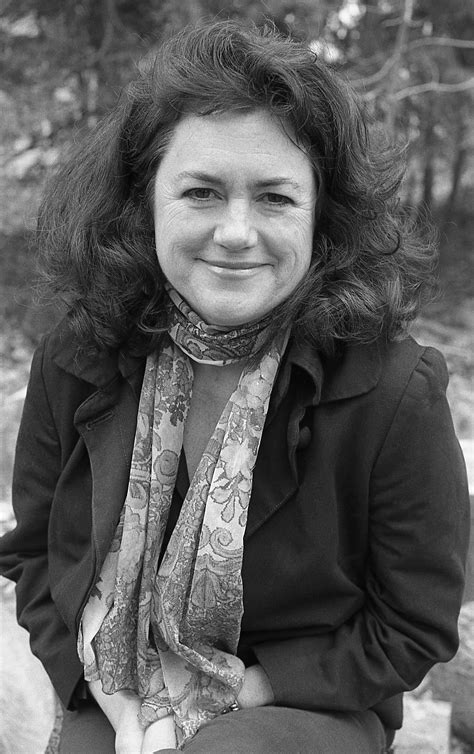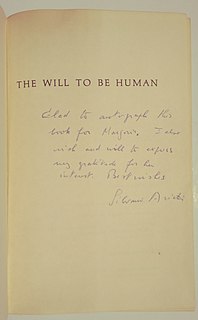A Quote by Georg C. Lichtenberg
I have often noticed that when people come to understand a mathematical proposition in some other way than that of the ordinary demonstration, they promptly say, "Oh, I see. That's how it must be." This is a sign that they explain it to themselves from within their own system.
Quote Topics
Related Quotes
In the first place a philosophical proposition must be general. It must not deal specially with things on the surface of the earth, or within the solar system, or with any other portion of space and time. . . . This brings us to a second characteristic of philosophical propositions, namely that they must be a priori. A philosophical proposition must be such as can neither be proved nor disproved by empirical evidence. . . . Philosophy, if what has been said is correct, becomes indistinguishable from logic as that word has now come to be used.
I think some people are not interesting to themselves. They're the sad, resigned folk. When people call themselves ordinary - "I'm just an ordinary person" - you do wonder what they mean, because people who call themselves ordinary occasionally turn out to be serial killers. Beware of those who say they're ordinary.
You can understand other people only as much as you understand yourself and only on the level of your own being. This means you can judge other people's knowledge but you cannot judge their being. You can see in them only as much as you have in yourself. But people always make the mistake of thinking they can judge other people's being. In reality, if they wish to meet and understand people of a higher development than themselves they must work with the aim of changing their being.
I just started asking my friends if they had noticed. None of them - feminists, mothers, daughters - noticed until I pointed it out. Then I decided to bring it up within the industry. I knew a lot of people, so I'd say, "Have you ever noticed how few female characters there are in kids movies?" when I met a director, a producer, whatever. And they said, "Oh, but that's not true anymore."
I have learned that some people who look fine are more crippled than I am, by fears they can’t explain. Other people are held back by shyness, or anger. In making friends, I see the way some people handicap themselves. I believe there are choices each of us make every single day. We can dwell on our limitations or we can push ourselves past them.
Each one of us has lived through some devastation, some loneliness, some weather superstorm or spiritual superstorm, when we look at each other we must say, I understand. I understand how you feel because I have been there myself. We must support each other and empathize with each other because each of us is more alike than we are unalike.
All I'm doing, all I have done for 40 years, is spend time with the best scientific experts, gain their confidence, and take advantage of their patience in explaining things to me over and over again in progressively simpler language that I can understand, so that I can read it back to them and get their sign off, where they say, "Yep, that's it, Al. You've got it." When I understand it, I know I can explain it to other people. When the scientists' predictions end up being true, I see that as an opportunity to say to people, "Listen carefully to what they're saying now."
I'm usually the last to see my influence in other people's work. People give me stuff and say "Oh look, this guy's ripping you off," and I'm like "What do you mean?" Often I see the people that I've ripped off filtered into my own work. In other people's work, I can only see specific, tiny little instances of inflections stolen from another artist.
Do you not think that there are things which you cannot understand, and yet which are; that some people see things that others cannot? But there are things old and new which must not be contemplate by men´s eyes, because they know -or think they know- some things which other men have told them. Ah, it is the fault of our science that it wants to explain all; and if it explain not, then it says there is nothing to explain.
There's also something that is often mistaken for enlightenment which is a kind of insanity. Often, people will have some kind of weird experience which is quite abnormal and think, "Oh my God, that's it, I understand everything" because they start seeing things in a very weird way and think that's how enlightened people see things as well.
To make our position clearer, we may formulate it in another way. Let us call a proposition which records an actual or possible observation an experiential proposition. Then we may say that it is the mark of a genuine factual proposition, not that it should be equivalent to an experiential proposition, or any finite number of experiential propositions, but simply that some experiential propositions can be deduced from it in conjunction with certain other premises without being deducible from those other premises alone.
Creativity is not simply originality and unlimited freedom. There is much more to it than that. Creativity also imposes restrictions. While it uses methods other than those of ordinary thinking, it must not be in disagreement with ordinary thinking-or rather, it must be something that, sooner or later, ordinary thinking will understand, accept, and appreciate. Otherwise the result would be bizarre, not creative.
THE FATHER: But don't you see that the whole trouble lies here? In words, words. Each one of us has within him a whole world of things, each man of us his own special world. And how can we ever come to an understanding if I put in the words I utter the sense and value of things as I see them; while you who listen to me must inevitably translate them according to the conception of things each one of you has within himself. We think we understand each other, but we never really do.




































